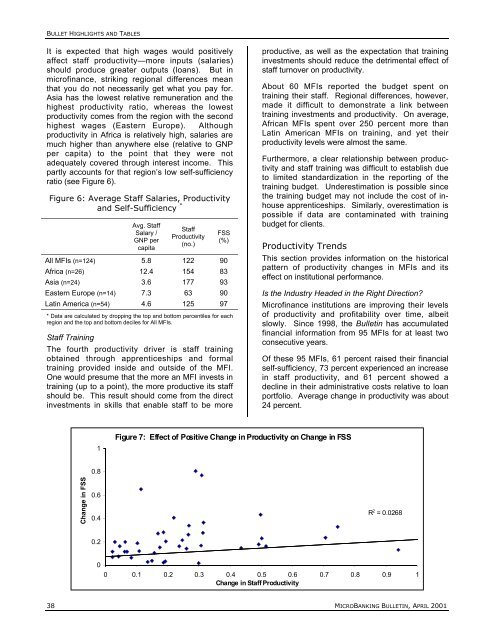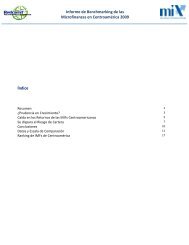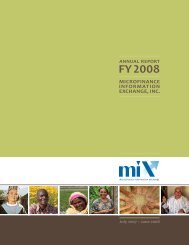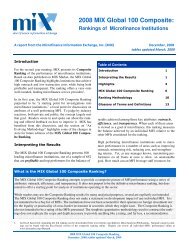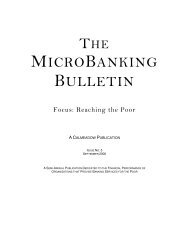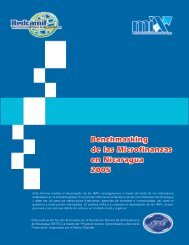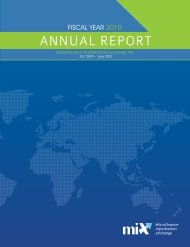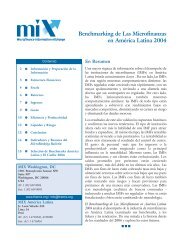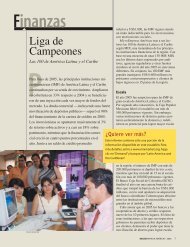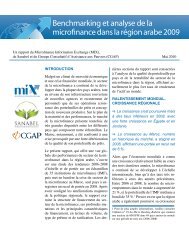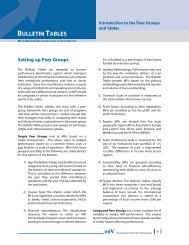the microbanking bulletin - Microfinance Information Exchange
the microbanking bulletin - Microfinance Information Exchange
the microbanking bulletin - Microfinance Information Exchange
You also want an ePaper? Increase the reach of your titles
YUMPU automatically turns print PDFs into web optimized ePapers that Google loves.
BULLET HIGHLIGHTS AND TABLESIt is expected that high wages would positivelyaffect staff productivity—more inputs (salaries)should produce greater outputs (loans). But inmicrofinance, striking regional differences meanthat you do not necessarily get what you pay for.Asia has <strong>the</strong> lowest relative remuneration and <strong>the</strong>highest productivity ratio, whereas <strong>the</strong> lowestproductivity comes from <strong>the</strong> region with <strong>the</strong> secondhighest wages (Eastern Europe). Althoughproductivity in Africa is relatively high, salaries aremuch higher than anywhere else (relative to GNPper capita) to <strong>the</strong> point that <strong>the</strong>y were notadequately covered through interest income. Thispartly accounts for that region’s low self-sufficiencyratio (see Figure 6).Figure 6: Average Staff Salaries, Productivityand Self-Sufficiency *Avg. StaffSalary /GNP percapitaStaffProductivity(no.)FSS(%)All MFIs (n=124) 5.8 122 90Africa (n=26) 12.4 154 83Asia (n=24) 3.6 177 93Eastern Europe (n=14) 7.3 63 90Latin America (n=54) 4.6 125 97* Data are calculated by dropping <strong>the</strong> top and bottom percentiles for eachregion and <strong>the</strong> top and bottom deciles for All MFIs.Staff TrainingThe fourth productivity driver is staff trainingobtained through apprenticeships and formaltraining provided inside and outside of <strong>the</strong> MFI.One would presume that <strong>the</strong> more an MFI invests intraining (up to a point), <strong>the</strong> more productive its staffshould be. This result should come from <strong>the</strong> directinvestments in skills that enable staff to be moreproductive, as well as <strong>the</strong> expectation that traininginvestments should reduce <strong>the</strong> detrimental effect ofstaff turnover on productivity.About 60 MFIs reported <strong>the</strong> budget spent ontraining <strong>the</strong>ir staff. Regional differences, however,made it difficult to demonstrate a link betweentraining investments and productivity. On average,African MFIs spent over 250 percent more thanLatin American MFIs on training, and yet <strong>the</strong>irproductivity levels were almost <strong>the</strong> same.Fur<strong>the</strong>rmore, a clear relationship between productivityand staff training was difficult to establish dueto limited standardization in <strong>the</strong> reporting of <strong>the</strong>training budget. Underestimation is possible since<strong>the</strong> training budget may not include <strong>the</strong> cost of inhouseapprenticeships. Similarly, overestimation ispossible if data are contaminated with trainingbudget for clients.Productivity TrendsThis section provides information on <strong>the</strong> historicalpattern of productivity changes in MFIs and itseffect on institutional performance.Is <strong>the</strong> Industry Headed in <strong>the</strong> Right Direction?<strong>Microfinance</strong> institutions are improving <strong>the</strong>ir levelsof productivity and profitability over time, albeitslowly. Since 1998, <strong>the</strong> Bulletin has accumulatedfinancial information from 95 MFIs for at least twoconsecutive years.Of <strong>the</strong>se 95 MFIs, 61 percent raised <strong>the</strong>ir financialself-sufficiency, 73 percent experienced an increasein staff productivity, and 61 percent showed adecline in <strong>the</strong>ir administrative costs relative to loanportfolio. Average change in productivity was about24 percent.1Figure 7: Effect of Positive Change in Productivity on Change in FSSChange in FSS0.80.60.4R 2 = 0.02680.200 0.1 0.2 0.3 0.4 0.5 0.6 0.7 0.8 0.9 1Change in Staff Productivity38 MICROBANKING BULLETIN, APRIL 2001


